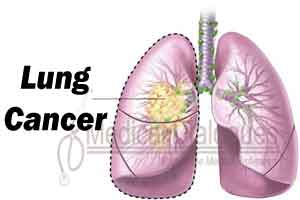- Home
- Editorial
- News
- Practice Guidelines
- Anesthesiology Guidelines
- Cancer Guidelines
- Cardiac Sciences Guidelines
- Critical Care Guidelines
- Dentistry Guidelines
- Dermatology Guidelines
- Diabetes and Endo Guidelines
- Diagnostics Guidelines
- ENT Guidelines
- Featured Practice Guidelines
- Gastroenterology Guidelines
- Geriatrics Guidelines
- Medicine Guidelines
- Nephrology Guidelines
- Neurosciences Guidelines
- Obs and Gynae Guidelines
- Ophthalmology Guidelines
- Orthopaedics Guidelines
- Paediatrics Guidelines
- Psychiatry Guidelines
- Pulmonology Guidelines
- Radiology Guidelines
- Surgery Guidelines
- Urology Guidelines
Adjuvant chemotherapy improves overall survival in patients with stage IB non-small cell lung cancer

Denver : The use of adjuvant chemotherapy in early-stage non small cell lung cancer (NSCLC) patients improves overall survival (OS) and 5-year OS in patients with tumor sizes ranging from 3–7 cm.
Stage I lung cancer, the earliest stage at which clinicians diagnose lung cancer, is identified in approximately 16% of all lung cancer cases in the U.S. For early-stage patients with medically operable clinical NSCLC, surgery is the treatment of choice. Several studies have found that patients with stage II and III NSCLC that had adjuvant chemotherapy following complete surgical resection lived longer than those that had surgery without chemotherapy. However, in early-stage NSCLC patients there currently is not enough evidence to support the use of chemotherapy following complete resection, even though stage I lung cancer recurs either locally or at distant sites in roughly a third of early-stage patients. Exploratory analysis of the use of adjuvant chemotherapy in early-stage patients showed improved overall survival for patients whose tumors were ≥ 4 cm. Consequently, a thorough investigation of the clinical benefits and survival of the use of adjuvant chemotherapy in early-stage patients is warranted in order to improve the current treatment recommendations.
A group of investigators analyzed a large cohort of patients (29,908 patients) with pathologic stage T2N0M0 NSCLC, diagnosed from 2003 to 2010, and who underwent complete (R0) resection to evaluate the role of adjuvant chemotherapy in early-stage patients. The patients were identified from the National Cancer Database (NCDB) using the International Classification of Diseases for Oncology, 3rd Edition and pathologic staging was based on the American Joint Committee on Cancer, 7th Edition staging criteria. Patients who died within 30 days after surgery were excluded from the study. Patients were categorized into two cohorts: those who received adjuvant chemotherapy (5,209, 17.4%) and those who did not (24,699, 82.6%). The cohorts were further divided into four groups based on tumor size: 3-3.9 cm, 4-4.9 cm, 5-5.9 cm, and 6-7 cm.
The results published in the Journal of Thoracic Oncology, the official journal of the International Association for the Study of Lung Cancer (IASLC), demonstrated that adjuvant chemotherapy was associated with improved median overall survival (OS) and 5-year OS compared to the observation group in both univariate (one variable) and multivariate (multiple variables) analyses. In the univariate analysis, the 5-year OS for patients not receiving adjuvant chemotherapy was inversely related to tumor size, decreasing from 58% in 3-3.9 cm to 46.9% in 6-7 cm. However, in patients that received adjuvant chemotherapy 5-year OS was nearly identical for 4-4.9 cm, 5-5.9 cm, and 6-7 cm groups. Furthermore, all patients receiving adjuvant chemotherapy, regardless of tumor size, showed improved median OS (95.6 vs. 67.0 months, Hazard Ratio (HR) 0.64; 95% CI 0.61-0.68, P<0.0001) and 5-year OS (67.9% vs. 54.6%, P<0.0001) when compared to the observation group (see Figure 1 below). The multivariate analysis, which took into account various characteristics (i.e. age, histology, type of surgery) also demonstrated benefit from adjuvant chemotherapy for all patient groups, with HR for mortality inversely related to the tumor size, ranging from 0.75 in 3-3.9 cm – 0.62 in 6-7 cm patient groups.
The authors comment that, “There are several limitations to our data including the retrospective nature of the study, with limited information on the reasons for the choice between chemotherapy and observation. Furthermore, there is no data on staging procedures prior to the surgical resection or type of chemotherapy regimens used. Another potential limitation is the presence of selection bias since patients had to survive long enough to have the adjuvant chemotherapy administered. However, our data suggest that there is a benefit from adjuvant chemotherapy in patients with completely resected stage T2N0M0 NSCLC regardless of tumor size. Assuming similar biases for the use of chemotherapy in all tumor size subgroups, the elimination of patients with early surgical mortality and the confirmed benefit from adjuvant chemotherapy in multivariable analysis, our study suggests that the postulated benefit from adjuvant chemotherapy in patients with stage T2N0M0 NSCLC may be extended to 3-3.9 cm tumor size. Therefore, if this hypothesis is either confirmed or not further evaluated in prospective trials, the current exclusion of stage IB tumors < 4 cm in adjuvant NSCLC trials should be revisited.”
You can read the full article by clicking on the following link :
Daniel Morgensztern, Lingling Du, Saiama N. Waqar, Aalok Patel, Pamela Samson, Siddhartha Devarakonda, Feng Gao, Clifford Robinson, Jeffrey Bradley, Maria Baggstrom, Ashiq Masood, Ramaswamy Govindan, Varun Puri. Adjuvant Chemotherapy for Patients with T2N0M0 Non-small-cell Lung Cancer (NSCLC). Journal of Thoracic Oncology, 2016; DOI:10.1016/j.jtho.2016.05.022

Disclaimer: This site is primarily intended for healthcare professionals. Any content/information on this website does not replace the advice of medical and/or health professionals and should not be construed as medical/diagnostic advice/endorsement or prescription. Use of this site is subject to our terms of use, privacy policy, advertisement policy. © 2020 Minerva Medical Treatment Pvt Ltd